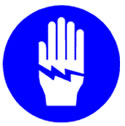 Electric power and electronic appliances are so integrated with modern life that there is a high degree of likelihood that everyone will receive one or more electric shocks in a lifetime. In many cases, only trivial power levels are involved. However, when electric shocks cause damage to humans or even result in death (defined as an electrocution), then improper control or isolation of the associated electric power must be investigated. Shocks are typically caused by faulty ground connections, inadequate insulation, or improper circuit design. Establishing the causes of shocks and their effect upon humans is key to establishing liability.
Electric power and electronic appliances are so integrated with modern life that there is a high degree of likelihood that everyone will receive one or more electric shocks in a lifetime. In many cases, only trivial power levels are involved. However, when electric shocks cause damage to humans or even result in death (defined as an electrocution), then improper control or isolation of the associated electric power must be investigated. Shocks are typically caused by faulty ground connections, inadequate insulation, or improper circuit design. Establishing the causes of shocks and their effect upon humans is key to establishing liability.
Expertise
We have extensive experience in many aspects of electric shock including:
- Measuring voltage, current and impedance under varying conditions
- Using fake and real humans to safely experience the full effects of a shock
- Analysis of instrument data from medical, electrical and mechanical devices
- Human electric tolerance standards
Questions Answered
Through scientific analysis, we can help you answer pertinent questions such as:
- Were safety rules violated causing the electrocution?
- How did the victim receive the shock and what injuries were caused by it?
- Did contact with a metal surface or the victim's apparel affect the shock?
Case Examples
Grocery Store Shock:
A woman working in a grocery store received a shock from a wooden display case. She had an electrician's report (taken within an hour of the accident) that said there was a high voltage in the display case, but the electrician's report was flawed. We re-investigated and found the same results as the electrician. We also explained the nature of the flaws in the electrician's report and showed that they had nothing to do with the validity of the woman's claim, validating her case.
Refrigerator Shock:
A female restaurant employee claimed to receive a debilitating shock from a refrigerator, which was not grounded. She had extensive injuries, but she also had suffered another accident unrelated to this case, which could have caused these injuries. Medical doctors couldn't determine which accident caused her problems. We recreated the accident using a "fake human" and then a real human in the same setup. Documentation of on-site results convinced a jury and the restaurant prevailed.
Kristopher J. Seluga, PE, is a Mechanical Engineering, Accident Reconstruction, Biomechanics, and Safety Expert with over 20 years of experience. He received his Bachelor's and Master's degrees from the Mechanical Engineering department at MIT where he worked on the development of novel three-dimensional printing technologies. Mr. Seluga is also a licensed Professional Engineer in New York and Connecticut, and has served as a member of the ANSI engineering committee for the Z130.1 and Z135 standards for golf cars and PTV's. His research interests and peer reviewed publications span the topics of Motor Vehicle Dynamics, Product Safety, and Biomechanics.
©Copyright - All Rights Reserved
DO NOT REPRODUCE WITHOUT WRITTEN PERMISSION BY AUTHOR.



 Electric power and electronic appliances are so integrated with modern life that there is a high degree of likelihood that everyone will receive one or more electric shocks in a lifetime. In many cases, only trivial power levels are involved. However, when
Electric power and electronic appliances are so integrated with modern life that there is a high degree of likelihood that everyone will receive one or more electric shocks in a lifetime. In many cases, only trivial power levels are involved. However, when 





